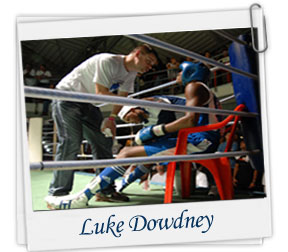 Luke studied for an MA in Social Anthropology at Edinburgh University and wrote his dissertation on street children in Brazil. He has coordinated extensive research on children in organised, armed violence. Drawing on a passion for boxing he founded the Fight for Peace gym in Rio de Janeiro in 2000 and is now extending this project globally.
Luke studied for an MA in Social Anthropology at Edinburgh University and wrote his dissertation on street children in Brazil. He has coordinated extensive research on children in organised, armed violence. Drawing on a passion for boxing he founded the Fight for Peace gym in Rio de Janeiro in 2000 and is now extending this project globally.
I chose to study anthropology at Edinburgh University because it offered me the opportunity to travel. The course was a four year MA which involved six months of field research. I decided to write my dissertation on violence and street children in Brazil because in the late 80s and early 90s this issue was in the media and as a young student it made sense to tackle it. My experiences during fieldwork drove me to become more involved in projects to tackle the participation of children in organised, armed violence.
Development work interested me so after university I looked for employment with aid agencies. They all expected prior experience and I ended up being caught in a catch-22 as I couldn't get any experience because none of the organisations would offer me a job. I eventually decided to move to Japan for a year and make some money working as an amateur boxer before returning to Brazil where I began coordinating youth programmes in the favelas of Rio de Janeiro for the Brazilian NGO Viva Rio.
My first book, ‘Children of the Drug Trade’, was written to make policy makers aware of the extent of the involvement of children in drug trafficking. The skills I learned during my MA, such as rigorous empirical research and critical analysis, were very useful in researching for this book. Between 2001 and 2002, I coordinated another project documenting and comparing instances of children and youth involvement in organised violence across ten countries. The results of this study are published in my second book entitled ‘Neither War nor Peace’.
Alongside my work for Viva Rio I started Fight for Peace; a project to help to encourage children away from gangs and trafficking. I opened up a small gym in a favela complex and started to train children, boosting their resilience and confidence so that they, through their own choice, would be less likely to get drawn into trafficking. We now have funding for a full sports centre with a range of athletic activities and are able to train over three-hundred children per year. Currently I am involved in replicating the project in the east end of London.
Anthropology for me is just common sense, the common sense of whoever you are among. The most important thing is to listen and try to understand from a different perspective. Anthropology deals with real people in the here and now who are very complex, who have feelings, and ideas. What you do has real impact on them. So whilst it is useful and offers lots of skills for the person doing the studying, anthropologists should always try to give something back to the people they study.

